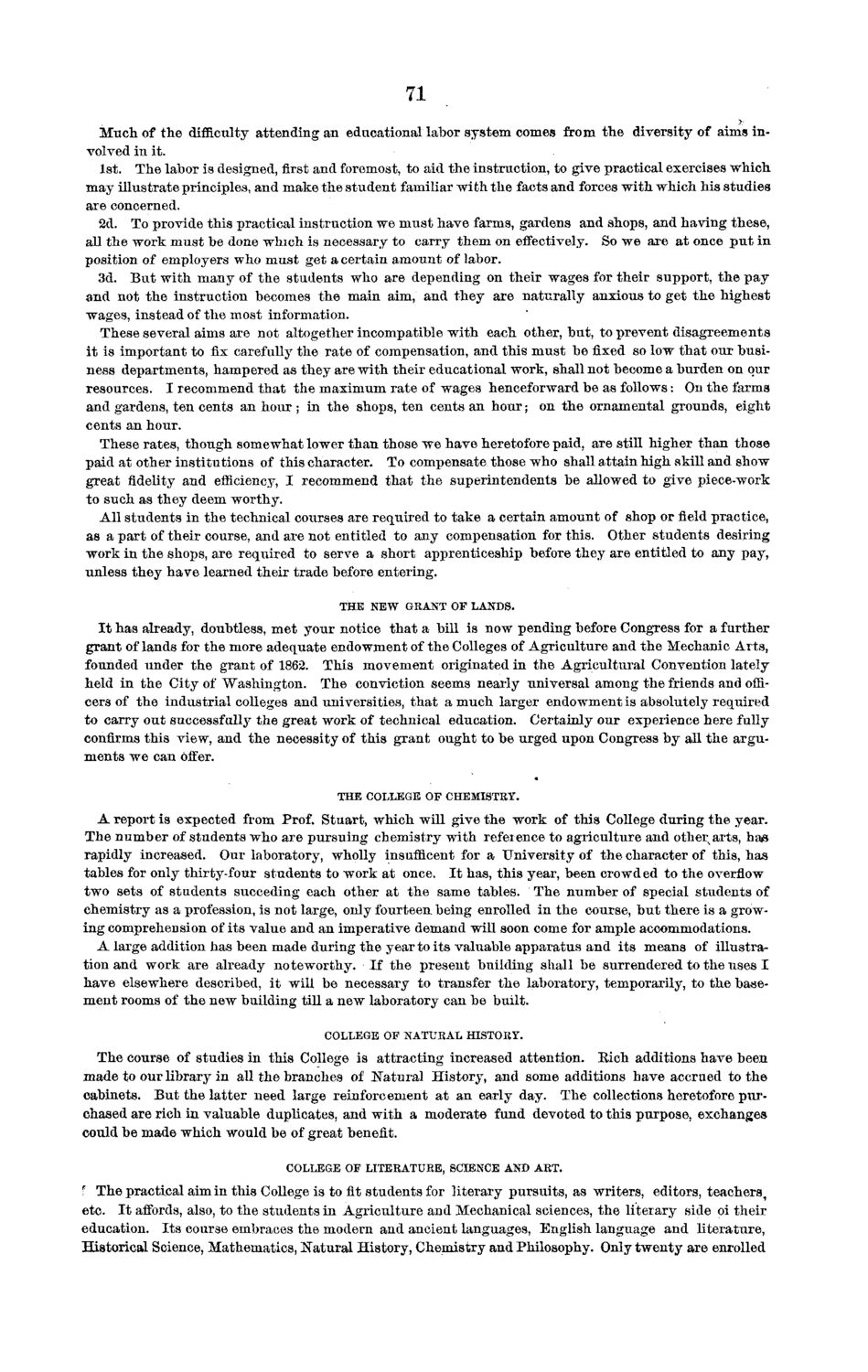| |
| |
Caption: Board of Trustees Minutes - 1872
This is a reduced-resolution page image for fast online browsing.

EXTRACTED TEXT FROM PAGE:
71 Much of the difficulty attending an educational labor system comes from the diversity of aims involved in it. 1st. The labor is designed, first and foremost, to aid the instruction, to give practical exercises which may illustrate principles, and make the student familiar with the facts and forces with which his studies are concerned. 2d. To provide this practical instruction we must have farms, gardens and shops, and having these, all the work must be done which is necessary to carry them on effectively. So we are at once put in position of employers who must get a certain amount of labor. 3d. But with many of the students who are depending on their wages for their support, the pay and not the instruction becomes the main aim, and they are naturally anxious to get the highest wages, instead of the most information. These several aims are not altogether incompatible with each other, but, to prevent disagreements it is important to fix carefully the rate of compensation, and this must be fixed so low that our business departments, hampered as they are with their educational work, shall not become a burden on our resources. I recommend that the maximum rate of wages henceforward be as follows: On the farms and gardens, ten cents an hour ; in the shops, ten cents an hour; on the ornamental grounds, eight cents an hour. These rates, though somewhat lower than those we have heretofore paid, are still higher than those paid at other institutions of this character. To compensate those who shall attain high skill and show great fidelity and efficiency, I recommend that the superintendents be allowed to give piece-work to such as they deem worthy. All students in the technical courses are required to take a certain amount of shop or field practice, as a part of their course, and are not entitled to any compensation for this. Other students desiring work in the shops, are required to serve a short apprenticeship before they are entitled to any pay, unless they have learned their trade before entering. T H E NEW GRANT OF LANDS. I t has already, doubtless, met your notice that a bill is now pending before Congress for a further grant of lands for the more adequate endowment of the Colleges of Agriculture and the Mechanic Arts, founded under the grant of 1862. This movement originated in the Agricultural Convention lately held in the City of Washington. The conviction seems nearly universal among the friends and officers of the industrial colleges and universities, that a much larger endowment is absolutely required to carry out successfully the great work of technical education. Certainly our experience here fully confirms this view, and the necessity of this grant ought to be urged upon Congress by all the arguments we can offer. THE COLLEGE O F CHEMISTRY. A report is expected from Prof. Stuart, which will give the work of this College during the year. The number of students who are pursuing chemistry with reference to agriculture and other arts, has rapidly increased. Our laboratory, wholly insufiicent for a University of the character of this, has tables for only thirty-four students to work at once. I t has, this year, been crowded to the overflow two sets of students succeding each other at the same tables. The number of special students of chemistry as a profession, is not large, only fourteen, being enrolled in the course, but there is a growing comprehension of its value and an imperative demand will soon come for ample accommodations. A large addition has been made during the year to its valuable apparatus and its means of illustration and work are already noteworthy. If the present building shall be surrendered to the uses I have elsewhere described, it will be necessary to transfer the laboratory, temporarily, to the basement rooms of the new building till a new laboratory can be built. COLLEGE OF NATURAL HISTORY. The course of studies in this College is attracting increased attention. Rich additions have been made to our library in all the branches of Natural History, and some additions have accrued to the cabinets. But the latter need large reinforcement at an early day. The collections heretofore purchased are rich in valuable duplicates, and with a moderate fund devoted to this purpose, exchanges could be made which would be of great benefit. COLLEGE OF LITERATURE, SCIENCE AND ART. The practical aim in this College is to fit students for literary pursuits, as writers, editors, teachers, etc. I t affords, also, to the students in Agriculture and Mechanical sciences, the literary side oi their education. Its course embraces the modern and ancient languages, English language and literature, Historical Science, Mathematics, Natural History, Chemistry and Philosophy. Only twenty are enrolled r
| |